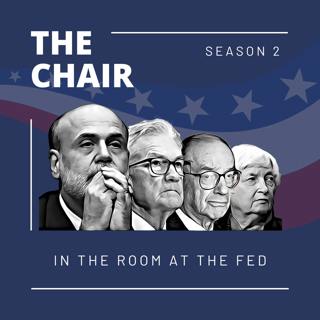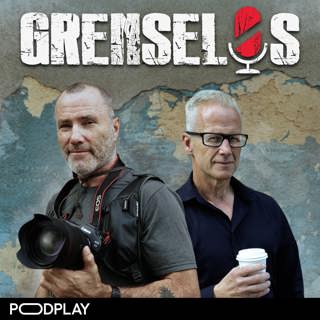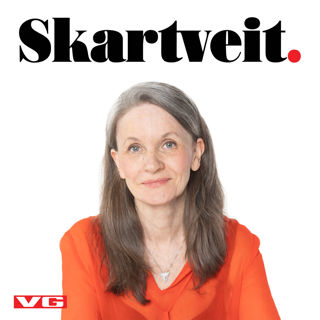
Jerome Powell: “We don't think you're a straight shooter"
More than any one institution, the US Federal Reserve drives global capital markets with its decisions and communications. While its interest rates are set by a committee, for almost a century, the Fed’s philosophy and operational approach have been moulded by one person: the Chair of the Board of Governors. In the first series of The Chair, Tim Gwynn Jones talked to authors of books about the Fed's foundational Chairs – Marriner Eccles, Bill Martin, Arthur Burns, and Paul Volcker. In this second series, he covers the people who chaired the Fed through the post-1990 period of financialisation, globalisation, and – perhaps today – deglobalisation. This eighth and final episode covers the life and times of the current chair, Jerome ("Jay") Powell - the technocratic lawyer-turned-banker who managed the global economy through two unprecedented disasters: the Covid pandemic and Donald Trump’s protectionist trade policies. As the episodes about Martin, Burns, and Volcker all attest, Powell isn't the first chairman to face political blowback. But he is the first to be publicly denounced as “Mr Too Late” and a “major loser” by a president intent on removing him from office before his term ends in mid-2026. To discuss Powell, Tim is joined by Nick Timiraos, author of Trillion Dollar Triage: How Jay Powell and the Fed Battled a President and a Pandemic and Prevented Economic Disaster (Little, Brown, 2022). “If people think you're not going to act in the country's best interest, that's bad for the Fed,” he says. “The next time the Fed decides it needs to do something that actually is ‘exigent and unusual’, people will say: ‘Well, wait a minute, the last time you did this, we thought you were a toady for the Democrats or a toady for the Republicans. We don't think you're a straight shooter. We're not going to let you raise interest rates by 25 basis points. We're not going to give you money to backstop your purchases of corporate credit’. Those are the kind of medium and long term risks from a fight with the White House. I think, for Powell, the worst outcome is that people don't think you have an independent central bank anymore. Your monetary policy won't be credible. Why not just roll that thing into the Treasury Department if that's what you're going to do?” Since 2017, Nick Timiraos has been the chief economics correspondent at The Wall Street Journal and has developed an unrivalled reputation as the "Fed whisperer". Learn more about your ad choices. Visit megaphone.fm/adchoices Support our show by becoming a premium member! https://newbooksnetwork.supportingcast.fm/biography
4 Mai 51min

Janet Yellen: “She had a view that the world was on fire”
More than any other single institution, the US Federal Reserve drives global capital markets with its decisions and communications. While its interest rates are set by a committee, for almost a century, the Fed’s philosophy and operational approach have been moulded by one person: the Chair of the Board of Governors. In the first series of The Chair, Tim Gwynn Jones talked to authors of books about the Fed's foundational Chairs – Marriner Eccles, Bill Martin, Arthur Burns, and Paul Volcker. In this second series, he covers the people who chaired the Fed through the post-1990 period of financialisation, globalisation, and – perhaps today – deglobalisation. The third episode of the second series covers Janet Yellen – not only the first woman to become Fed Chair but the first person of either sex to lead the Fed, the Treasury, and the Council of Economic Advisors. To discuss Ben Bernanke’s successor, Tim is joined by Jon Hilsenrath, author of Yellen: The Trailblazing Economist Who Navigated an Era of Upheaval (Harper Collins, 2022). “Bernanke was a consensus builder,” says Hilsenrath. “He wasn't the kind of guy who was going to push people on a personal level out of their comfort zones … Yellen was a bit of a bulldog there, but she was also a bulldog with the Fed staff. I mean, she had a view that the world was on fire and that they, you know, and that they had to be moving like people putting out a fire”. In 2023, Hilsenrath left the Wall Street Journal after a 26-year career during which he developed a market reputation as a pre-eminent Fed-watcher. He’s still watching the Fed but now for his own advisory firm. Learn more about your ad choices. Visit megaphone.fm/adchoices Support our show by becoming a premium member! https://newbooksnetwork.supportingcast.fm/biography
3 Mai 59min

Ben Bernanke: “Like being a paleontologist”
More than any other single institution, the US Federal Reserve drives global capital markets with its decisions and communications. While its interest rates are set by a committee, for almost a century, the Fed’s philosophy and operational approach have been moulded by one person: the Chair of the Board of Governors. In the first series of The Chair, Tim Gwynn Jones talked to authors of books about the Fed's foundational Chairs – Marriner Eccles, Bill Martin, Arthur Burns, and Paul Volcker. In this second series, he covers the people who chaired the Fed through the post-1990 period of financialisation, globalisation, and – perhaps today – deglobalisation. Episode two of the second series covers the life and crisis-era times of Ben Bernanke, the man who filled Alan Greenspan’s big shoes and ran the Fed from 2006 to 2014. A shy but world-renowned monetary economist and historian of the Great Depression, Bernanke was left holding the proverbial bomb when the financial system came close to collapse in 2008. To discuss Bernanke, Tim is joined by David Wessel, author of In FED We Trust: Ben Bernanke's War on the Great Panic (Crown, 2010). “It wasn't obvious when he was appointed to the Fed in 2006 that having somebody who had spent their life studying the Great Depression would be well equipped to be Alan Greenspan's successor,” says Wessel. “I have sometimes said it was a like being a paleontologist. It's very nice that you know a lot about dinosaurs, but what use is that to us today until one day a Stegosaurus appears on the horizon. And it was remarkable good fortune for the country and the world that there was a guy who happened to have studied all the mistakes that the Fed made in the 1920s and the 1930s in a position to do something about it when a situation, not all that dissimilar, appears both to his surprise and to almost everybody else's”. Wessel is two-time Pulitzer Prize winning journalist who now runs the Hutchins Center on Fiscal and Monetary Policy at the Brookings Institution. For 30 years, he worked at the Wall Street Journal - reporting mostly from Washington and covering economics and the Fed. Learn more about your ad choices. Visit megaphone.fm/adchoices Support our show by becoming a premium member! https://newbooksnetwork.supportingcast.fm/biography
2 Mai 44min

Alan Greenspan: “The man who knew”
More than any other single institution, the US Federal Reserve drives global capital markets with its decisions and communications. While its interest rates are set by a committee, for almost a century, the Fed’s philosophy and operational approach have been moulded by one person: the Chair of the Board of Governors. In the first series of The Chair, Tim Gwynn Jones talked to authors of books about the Fed's foundational Chairs – Marriner Eccles, Bill Martin, Arthur Burns, and Paul Volcker. In this second series, he covers the people who chaired the Fed through the post-1990 period of financialisation, globalisation, and – perhaps today – deglobalisation. The first episode of the second series explores Alan Greenspan, the chairman who followed Paul Volcker and ran the Fed from 1987 until 2006. Once bestowed with “Maestro” status, Greenspan – who turns 100 in March 2026 – has seen his reputation deflate in the wake of the post-2008 financial crisis. To discuss the fallen Maestro, Tim is joined by Sebastian Mallaby, author of The Man Who Knew: The Life and Times of Alan Greenspan (Bloomsbury, 2016). “Greenspan was the man who knew,” says Mallaby. “He was the man who knew that bubbles were extremely destructive, and yet he was not the man who acted against those bubbles. So, whilst he was great on inflation and on stabilising the price of eggs, he was not good on asset-price inflation or stabilising the price of nest eggs”. A former journalist at The Economist and the Washington Post, Mallaby is the prize-winning author of The World's Banker – a portrait of the World Bank under James Wolfensohn – and More Money Than God: Hedge Funds and the Making of a New Elite. He is now the Paul A. Volcker senior fellow for international economics at the Council on Foreign Relations. Learn more about your ad choices. Visit megaphone.fm/adchoices Support our show by becoming a premium member! https://newbooksnetwork.supportingcast.fm/biography
1 Mai 49min

Alexandra Popoff, "Vasily Grossman and the Soviet Century" (Yale UP, 2019)
Memory and truth are malleable and nowhere more so than in the Soviet Union. To be a writer in that country was to face an ongoing dilemma: conform to State-mandated topics and themes, or consign oneself to obscurity, writing only for “the desk drawer” or “without permission.” Vasily Grossman challenged that binary choice, creating some of the most compelling and uncompromising fiction and journalism of the century, but also enduring heartbreaking censorship. Her excellent new biography, Vasily Grossman and the Soviet Century (Yale University Press, 2019) brings the life and work of this often-overlooked writer into brilliant focus. Biography of a writer — particularly one with Grossman’s output — can be tricky to pull off, but Popoff’s extensive research is elegantly arranged into a very readable narrative, in which we follow Grossman through the harrowing experiences of witnessing first hand, famine in the 1920s, the Terror of the 1930s, the carnage of World War II, and the dull ache of censorship in the post-war Soviet Union. Jennifer Eremeeva is an American expatriate writer who divides her time between Riga, Latvia, and New England. Jennifer writes about travel, food, lifestyle, and Russian history and culture with bylines in Reuters, Fodor’s, The Moscow Times, and Russian Life. She is the in-house travel blogger for Alexander & Roberts, and the award-winning author of Lenin Lives Next Door: Marriage, Martinis, and Mayhem in Moscow. Follow Jennifer on Twitter, Instagram, and Facebook or visit jennifereremeeva.com for more information. Learn more about your ad choices. Visit megaphone.fm/adchoices Support our show by becoming a premium member! https://newbooksnetwork.supportingcast.fm/biography
24 Apr 1h 9min

Chris Stowers, "Shoot, Ask...and Run" (Earnshaw Books Ltd, 2025)
Chris Stowers, longtime photographer, credits a fellow journalist for the title of his latest memoir, Shoot, Ask...and Run (Earnshaw, 2025). The journalist’s advice to a young Chris, just starting out, went like this. Shoot: Take the photo when the opportunity arises. Then, if someone notices that you took a photo, “ask” for permission to use the photo. Finally, if the subject seems annoyed, “run”...particularly if he or she has a gun. Shoot, Ask...and Run is the second memoir from Chris Stowers, who previously joined the podcast to talk about his first memoir, Bugis Nights (Earnshaw: 2023). Chris is a photojournalist based in Asia. He has traveled, lived and worked in more than seventy countries. His work has appeared in most major international newspapers and magazines, among them: Time, Newsweek, The Economist, Forbes, Businessweek and The New York Times. Listen to Chris’s first interview, on Bugis Nights! You can find more reviews, excerpts, interviews, and essays at The Asian Review of Books. Follow on Twitter at @BookReviewsAsia. Nicholas Gordon is an editor for a global magazine, and a reviewer for the Asian Review of Books. He can be found on Twitter at @nickrigordon. Learn more about your ad choices. Visit megaphone.fm/adchoices Support our show by becoming a premium member! https://newbooksnetwork.supportingcast.fm/biography
24 Apr 53min

Reider Payne, "War and Diplomacy in the Napoleonic Era" (Bloomsbury Academic, 2019)
Though Robert Stewart, Viscount Castlereagh remains well known today for his role in shaping the post-Napoleonic peace settlement in Europe, his half-brother Sir Charles Stewart has received far less attention despite his own prominent part in the politics and diplomacy of those years. In War and Diplomacy in the Napoleonic Era: Sir Charles Stewart, Castlereagh and the Balance of Power in Europe (Bloomsbury Academic, 2019), Reider Payne describes the adventurous life of the third Marquess of Londonderry and the roles he played in the events of his time. As a young man Charles Stewart initially pursued a career in the military rather than one in politics, and served in the cavalry during Great Britain’s war against revolutionary France in the 1790s. After a brief period in the War Office he resumed his military career and served with the Duke of Wellington in the Peninsular War. His record as an officer and his relationship with his half-brother led to his appointment as an ambassador – first to Prussia, then to Austria – in which roles he represented Britain at the courts of her most prominent allies during the final stages of the Napoleonic Wars. Though Charles was often better known for his social escapades, he served ably as Britain’s ambassador to Austria until his brother’s suicide in 1822, during which time he was active in both post-Napoleonic diplomacy and the efforts to collect incriminating evidence against Princess Caroline of Brunswick in aid of the Prince Regent’s effort to divorce her. Learn more about your ad choices. Visit megaphone.fm/adchoices Support our show by becoming a premium member! https://newbooksnetwork.supportingcast.fm/biography
23 Apr 1h 12min

Geoffrey Roberts, "Stalin's Library: A Dictator and His Books" (Yale UP, 2022)
In this engaging life of the twentieth century’s most self-consciously learned dictator, Geoffrey Roberts explores the books Stalin read, how he read them, and what they taught him. Stalin firmly believed in the transformative potential of words, and his voracious appetite for reading guided him throughout his years. A biography as well as an intellectual portrait, Stalin's Library: A Dictator and His Books (Yale UP, 2022) explores all aspects of Stalin’s tumultuous life and politics. Stalin, an avid reader from an early age, amassed a surprisingly diverse personal collection of thousands of books, many of which he marked and annotated, revealing his intimate thoughts, feelings, and beliefs. Based on his wide-ranging research in Russian archives, Roberts tells the story of the creation, fragmentation, and resurrection of Stalin’s personal library. As a true believer in communist ideology, Stalin was a fanatical idealist who hated his enemies—the bourgeoisie, kulaks, capitalists, imperialists, reactionaries, counter-revolutionaries, traitors—but detested their ideas even more. Geoffrey Roberts is emeritus professor of history at University College Cork and a member of the Royal Irish Academy. A leading Soviet history expert, his many books include an award-winning biography of Zhukov, Stalin’s General, and the acclaimed Stalin’s Wars: From World War to Cold War. Morteza Hajizadeh is a Ph.D. graduate in English from the University of Auckland in New Zealand. His research interests are Cultural Studies; Critical Theory; Environmental History; Medieval (Intellectual) History; Gothic Studies; 18th and 19th Century British Literature. YouTube channel. Learn more about your ad choices. Visit megaphone.fm/adchoices Support our show by becoming a premium member! https://newbooksnetwork.supportingcast.fm/biography
22 Apr 1h 21min





















